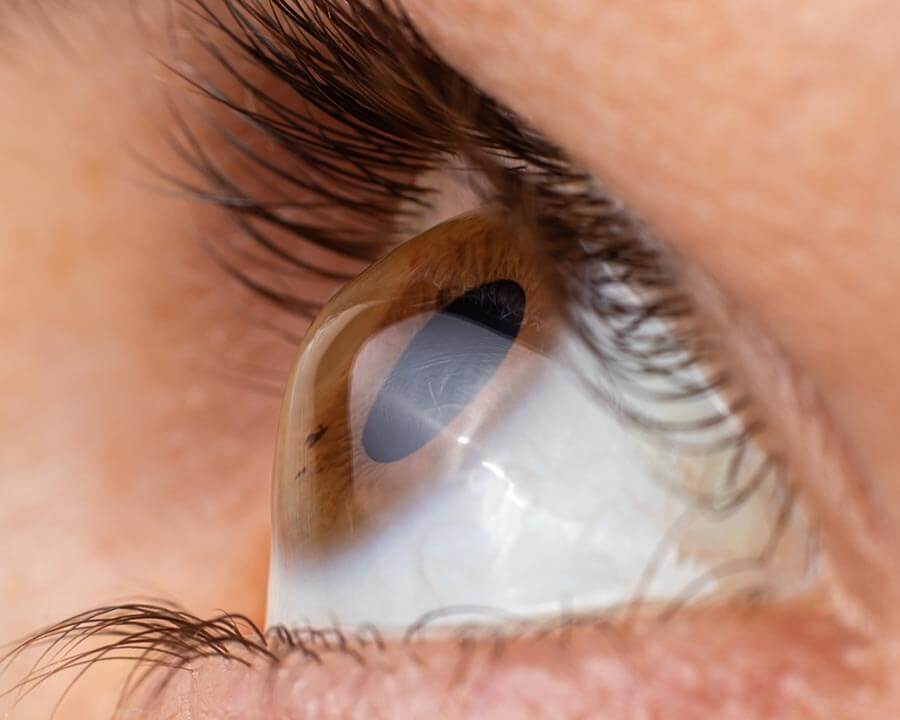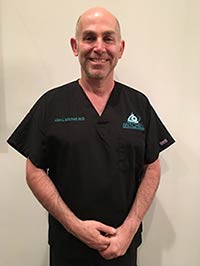Treatments and Conditions
When it comes to eye care, you want only the best. Mitchell Refractive Surgery & Eye Center is dedicated to treating your eyes, no matter what condition.
Our ophthalmologists offer various eye care services and over 30 years of experience to ensure our patients have a professional, personal, and positive vision experience with us.
Dry Eye Syndrome

Dry eye syndrome is a chronic eye condition typically occurring when the eyes cannot produce enough tears, or the tears produced are not good enough quality to deliver proper nutrients to the eye. As a result, the eyes feel dry, gritty, irritated, or watery.
Those with dry eyes may try making small lifestyle changes like drinking more water, reducing screen time, or using a humidifier to replace much-needed moisture in places like their office or home. Other treatments your ophthalmologist may recommend include inserting punctal plugs into the tear ducts to prevent tears from draining from the eye’s surface too quickly.
We may also recommend Restasis, a prescription artificial tear that helps increase tear production while providing lubrication. We also use Lumines OptiLight to treat dry eyes due to meibomian gland dysfunction (MGD).
OptiLight uses a tailored experience to provide patients with targeted and precise controlled treatment that decreases inflammation in a quick, 15-minute IPL procedure that restores meibomian gland functionality and reduces the population of Demodex mites to help patients find relief from dry eye symptoms.
Blepharitis
Blepharitis is an eye condition occurring when eyelash follicles become inflamed due to overgrown bacteria. An overgrowth in bacteria happens when the meibomian glands produce too much oil.
You may also have blepharitis due to reoccurring styes. Signs of blepharitis can include redness, crusty eyes, losing eyelashes, swollen eyes, itchiness, and burning. You can avoid blepharitis by observing proper eyelid hygiene and careful cleaning of the eyelids.
Glaucoma

Glaucoma is a group of eye conditions that cause damage to the optic nerve. The optic nerve sends images from the eye to the brain.
One of the most common reasons people develop glaucoma is increased intraocular pressure. You may have an increased risk of developing risk if you have a family history of the eye condition, you’re of African American descent, you have high blood pressure, or you’ve had a previous eye injury.
These are only some reasons contributing to someone’s risk of developing the condition, so disclose your family history and any pertinent information to your ophthalmologist. At Mitchell Refractive Surgery & Eye Center, we treat glaucoma using various options.
MIGS During Cataract Surgery
MIGS refers to minimally invasive glaucoma procedures. These procedures use microscopic instruments to perform small incision procedures. Many MIGS procedures can also be performed during cataract surgery to reduce the number of incisions and procedures performed.
iStent
iStent is the world’s smallest medical implant used to treat patients with mild to moderate open-angle glaucoma. It increases the eye’s ability to drain fluid, helping to reduce intraocular pressure.
Hydrus Microstent
Hydrus Microstent is a MIGS device used to treat open-angle glaucoma during cataract surgery. The Hydrus Microstent is placed through the trabecular meshwork and into Schlemm’s canal, helping to decrease intraocular pressure and enhance aqueous outflow.
MIGS
Gonioscopy-Assisted Transluminal Trabeculectomy (GATT)
GATT is a MIGS procedure that is used to treat open-angle glaucoma. It’s performed using micro-incisions in the cornea, cutting through the trabecular meshwork, and opening the complete drainage system to adequately lower intraocular pressure in the eye. GATT is not typically performed during cataract surgery.
Diabetic Retinopathy
Diabetic retinopathy is an eye condition that occurs when blood vessels in the retina suffer damage, unable to transport blood. When this happens, it cuts off the retina’s supply of blood and oxygen.
There are usually no symptoms in the early stages of diabetic retinopathy, but new blood vessels will form as it progresses. These are fragile and often leak, resulting in vision loss and blindness in more advanced stages of diabetic retinopathy, called proliferative retinopathy. If patients require treatment for diabetic retinopathy, we will refer them to a retina specialist.
Keratoconus
Keratoconus is an eye condition that occurs when the cornea becomes too thin, causing it to bulge out, like the shape of a cone. As keratoconus progresses, the cornea’s form continues to alter and become more cone-like, resulting in vision distortion.
Patients with keratoconus will likely begin noticing signs as a teen, but the condition usually slowly progresses over 10 to 20 years. During this time, symptoms will become more advanced.
Usually, keratoconus is treated using glasses, but patients may require rigid contact lenses to correct and improve their vision as the condition develops. Patients with severely impacted vision may need a corneal transplant. A corneal transplant can improve vision, but it cannot cure keratoconus.

Macular Degeneration
Macular degeneration (AMD) is an age-related eye condition that occurs when the retina is damaged and deteriorates. There are two kinds of macular degeneration: wet and dry.
Dry Macular Degeneration
Dry macular degeneration is the most common form of macular degeneration. It occurs when tissue in the macula becomes thin and makes vision blurry. Those with dry macular degeneration usually have it in both eyes. It happens slowly over time as part of the aging process.
Wet Macular Degeneration
Wet macular degeneration is the rarer of the two forms of macular degeneration. With wet macular degeneration, patients experience more severe vision loss. This happens because abnormal blood vessels develop under the retina, which leaks blood and fluids. As a result, permanent damage and loss of central vision occur and may result in the faster progression of macular degeneration.
Your Mitchell Refractive Surgery & Eye Center ophthalmologist will recommend the best treatment for macular degeneration, which may include vitamin supplements, laser therapy, photodynamic therapy, or medications that can help reduce the growth of abnormal blood vessels.
Learn more about the best way to treat your eyes by scheduling an appointment with one of the expert ophthalmologists at Mitchell Refractive Surgery & Eye Center in Boca Raton, FL, today!


